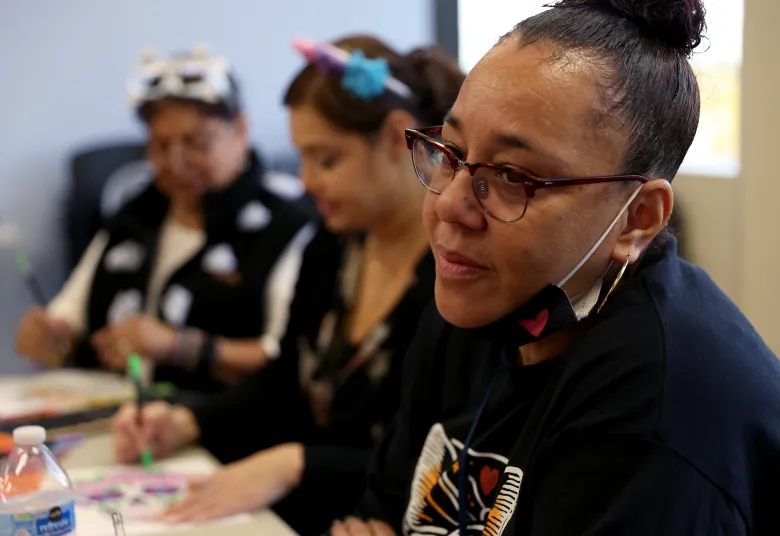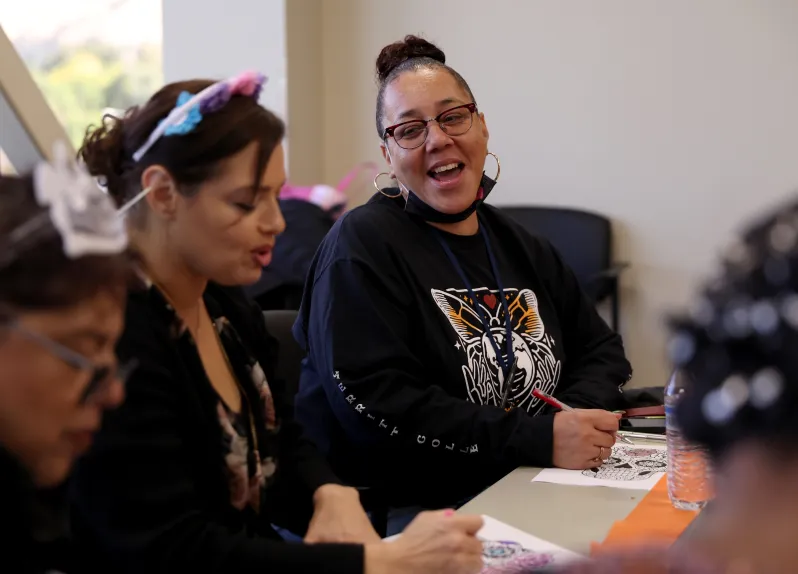Mila Rampola’s life has been full of overcoming struggles. Now, as she spends her days helping others in the same predicament, those experiences have come back to uplift her.
Rampola, a peer support worker at Bay Area Community Health, is dedicating her life to helping folks overcome substance use disorder. It is a daily, lifelong struggle but she’s well-equipped to dish out assistance, because 20 years ago she was the one seeking it.
“What BACH helped me realize was that, this negative place I was in — it doesn’t have to stay that way,” Rampola said. “It took a little bit of time but I finally realized, ‘Hey, I have control here. I can take life by the reins and it doesn’t have to be a defeatist situation.’”
Bay Area Community Health, based in Fremont and San Jose, offers medical treatment, addiction counseling and other health services to tens of thousands of people every year. The organization’s target population is the “medically unserved,” including unhoused or impoverished residents, as well as people suffering from HIV/AIDS and transgender people, BACH’s website says.
Last year, BACH served 65,900 people and is on pace for a similar patient base in 2024, according to Development Director Lucy Hernandez.
“We do try to go towards our underserved communities, but it’s also for those who delay healthcare and haven’t seen a doctor in however long. We want to have a conversation about getting them back into the healthcare system,” Hernandez said. “We try different avenues to bridge that gap. We want to be stewards of help, not just treating sickness.”
When it comes to assisting underserved communities, sometimes finding them can be half the battle. To overcome this obstacle, BACH has mobile units and outreach teams who regularly frequent local encampments to bring the health services with them.

“We go out four days every week, give out kits, give out Narcan (to prevent fentanyl overdoses),” said Veronika Rodriguez, a supervisor in the substance use disorder program at BACH. “We do Hep-C testing, HIV rapid testing, and link back to our mobile clinic as well.”
This gives outreach workers a frontlines perspective, and they’re often the first to notice certain trends. One recent curiosity appears to have come as a result of widespread knowledge over the deadly dangers of fentanyl use. More and more, BACH workers say they’ve seen people turn to methamphetamine use, though fentanyl continues to be the region’s biggest public safety threat among all commonly used drugs.
“As the overdose epidemic continued, people have slowly steered back to stimulants,” Rodriguez said. “But the problem now is that meth induces psychosis, so mental health has to be part of our care and treatment.”
For Rampola, her story starts 20 years ago as a single mother, when her life was in turmoil amid personal health concerns and drug addiction. She says she was at first reluctant to seek help, but her desire to build a better life for her daughter finally pushed her over the edge.
“At that time, my daughter was 8 and 9. She would always ask me, ‘Mom, why are you sick, why are you not taking the medicine?’” Rampola said “Her constantly pushing, telling me, ‘I want you to fight, I want you to live,’ that started to take its effect on me.”
Rampola’s life has come full circle. Now she comes to BACH’s Fremont facility on the fourth floor of 1860 Mowry Ave. as much as she can. A natural networker, Rampola’s skillset was crystal clear to the BACH staff even before the thought of working for the organization entered Rampola’s mind.
“Mila was constantly helping, bringing resources to every session,” Rodriguez said. “She made a big difference among the other group members, so when the position came up for group members, we were like, ‘Mila. Mila’s got to do it.’”
Currently undergoing training as a drug and alcohol counselor, Rampola is set to intern for BACH next year. When she’s not in Fremont, she spends her time pursuing drug addiction counseling studies at Merritt College in Oakland.
“I tell my daughter to this day — she’s 31 now — I tell her, ‘You and my grandson are the reason why I fight,’” Rampola said.
Her aspirations go even further; Rampola said her greatest goal is to form her own nonprofit dedicated to helping others in need.
“I want to do that same thing that BACH did for me,” she said.
